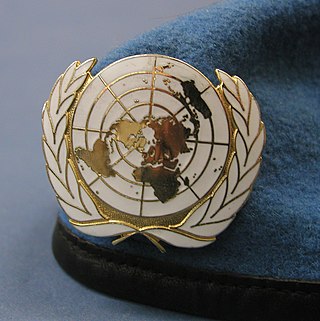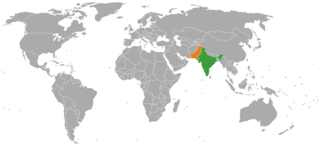
A ceasefire, also spelled cease-fire, is a stoppage of a war in which each side agrees with the other to suspend aggressive actions often due to mediation by a third party. Ceasefires may be between state actors or involve non-state actors.
The Karachi Agreement of 1949 was signed by the military representatives of India and Pakistan, supervised by the United Nations Commission for India and Pakistan, establishing a cease-fire line in Kashmir following the Indo-Pakistani War of 1947. It established a cease-fire line which has been monitored by United Nations observers from the United Nations since then.

The Kashmir conflict is a territorial conflict over the Kashmir region, primarily between India and Pakistan, and also between China and India in the northeastern portion of the region. The conflict started after the partition of India in 1947 as both India and Pakistan claimed the entirety of the former princely state of Jammu and Kashmir. It is a dispute over the region that escalated into three wars between India and Pakistan and several other armed skirmishes. India controls approximately 55% of the land area of the region that includes Jammu, the Kashmir Valley, most of Ladakh, the Siachen Glacier, and 70% of its population; Pakistan controls approximately 30% of the land area that includes Azad Kashmir and Gilgit-Baltistan; and China controls the remaining 15% of the land area that includes the Aksai Chin region, the mostly uninhabited Trans-Karakoram Tract, and part of the Demchok sector.

The United Nations Mission in Liberia (UNMIL) was a United Nations peacekeeping operation established in September 2003 to monitor a ceasefire agreement in Liberia following the resignation of President Charles Taylor and the conclusion of the Second Liberian Civil War (1999–2003). At its peak it consisted of up to 15,000 UN military personnel and 1,115 police officers, along with civilian political advisors and aid workers.

The United Nations has played an advisory role in maintaining peace and order in the Kashmir region soon after the independence and partition of British India into the dominions of Pakistan and India in 1947, when a dispute erupted between the two new States on the question of accession over the princely state of Jammu and Kashmir. India took this matter to the UN Security Council, which passed resolution 39 (1948) and established the United Nations Commission for India and Pakistan (UNCIP) to investigate the issues and mediate between the two new countries. Following the cease-fire of hostilities, it also established the United Nations Military Observer Group in India and Pakistan (UNMOGIP) to monitor the cease-fire line.

United Nations Security Council Resolution 39, adopted on January 20, 1948, offered to assist in the peaceful resolution of the Kashmir Conflict by setting up a commission of three members; one to be chosen by India, one to be chosen by Pakistan and the third to be chosen by the other two members of the commission. The commission was to write a joint letter advising the Security Council on what course of action would be best to help further peace in the region.

United Nations Security Council Resolution 47, adopted on 21 April 1948, concerns the resolution of the Kashmir conflict. After hearing arguments from both India and Pakistan, the Council increased the size of the UN Commission created by the former Resolution 39 to five members, instructed the Commission to go to the subcontinent and help the governments of India and Pakistan restore peace and order to the region and prepare for a plebiscite to decide the fate of Kashmir.

United Nations Security Council Resolution 80, adopted on March 14, 1950, having received the reports of the Commission for India and Pakistan, as well as a report from General A. G. L. McNaughton, the Council commended India and Pakistan for their compliance with the ceasefire and for the demilitarization of Jammu and Kashmir and agreement on Fleet Admiral Chester W. Nimitz as the future Plebiscite Administrator.

Pakistan has served in 46 United Nations peacekeeping missions in 29 countries around the world. As of 2023, United Nations (UN) statistics show that 168 Pakistani UN peacekeepers have been killed since 1948. The biggest Pakistani loss occurred on 5 June 1993 in Mogadishu. Pakistan joined the United Nations on 30 September 1947, despite opposition from Afghanistan because of the Durand Line issue. The Pakistan Armed Forces are the fifth largest contributor of troops towards UN peacekeeping efforts, behind India and Rwanda.

United Nations Security Council Resolution 122 was adopted on 24 January 1957 and concerned the dispute between the governments of India and Pakistan over the territories of Jammu and Kashmir. It was the first of three security resolutions in 1957 to deal with the dispute between the countries. The resolution declares that the assembly proposed by the Jammu and Kashmir National Conference could not constitute a solution to the problem as defined in United Nations Security Council Resolution 91 which had been adopted almost six years earlier.

United Nations Security Council Resolution 123 was adopted on February 21, 1957, after the conflict over Jammu and Kashmir intensified. The council requested that the President of the Security Council visit the subcontinent and, along with the governments of India and Pakistan, examine any proposals which were likely to contribute to the resolution of the dispute. The council requested that he report back to them no later than April 15, and the resulting report formed the basis of United Nations Security Council Resolution 126, which was adopted in December of the same year.

United Nations Security Council Resolution 126 was adopted on 2 December 1957. It was the last of three resolutions passed during 1957 to deal with the dispute between the governments of India and Pakistan over the territories of Jammu and Kashmir. It followed a report on the situation by Gunnar Jarring, representative for Sweden which the council had requested in resolution 123. It requests that the governments of India and Pakistan refrain from aggravating the situation, and instructs the United Nations Representative for India and Pakistan to visit the subcontinent and report to the council with recommended action toward further progress.

United Nations Security Council Resolution 209, adopted on September 4, 1965, with a deteriorating situation along the cease-fire line in Kashmir, the Council called upon both India and Pakistan to take all steps necessary to immediately cease fighting and return to their respective sides of the line. The Council also called on the two governments to co-operate fully with the United Nations Military Observer Group in Pakistan and asked the Secretary-General to report back on the implementation of the resolution within three days.

United Nations Security Council Resolution 211 was adopted on September 20, 1965. After the calls for a cease-fire in resolutions 209 and 210 went unheeded, the Council demanded that a cease-fire take effect at 0700 hours GMT on September 22 and that both forces withdraw to the positions held before August 5. The Council requested the Secretary-General ensure the supervision of the cease-fire and called on all states to refrain from any action which might aggravate the situation. The Council also decided that as soon as a cease-fire could be reached it would consider what steps could be taken to assist towards a settlement of the political problem underlying the conflict.

United Nations Security Council Resolution 214, adopted on September 27, 1965, after expressing concern that the cease-fire called for in resolutions 209, 210 and 211 was not holding, the Council demanded that the parties honor their commitment, cease-fire and withdraw all armed personnel.

United Nations Security Council Resolution 215, adopted on November 5, 1965, after the cease-fire called for in resolutions 209, 210, 211 and 214 and agreed to by India and Pakistan failed to materialize, the Council demanded that representatives of India and Pakistan meet with a representative of the Secretary-General to purpose schedules for the withdrawals. The Council urged this meeting to take place as soon as possible and requested the Secretary-General to submit a report on compliance with this resolution.

United Nations Security Council Resolution 303, adopted on December 6, 1971, after a lack of unanimity at the 1606th and 1607th meetings of the Council prevented it from exercising its primary responsibility, the Council decided to refer the question to the General Assembly.

United Nations Security Council resolution 1172, adopted unanimously on 6 June 1998, after hearing of nuclear tests conducted by India and Pakistan in May 1998, the Council condemned the tests and demanded that both countries refrain from engaging in further tests.

The Jammu and Kashmir Constituent Assembly was a body of representatives elected in 1951 to formulate the constitution of Jammu and Kashmir. The Constituent Assembly was dissolved on 26 January 1957, based on Mir Qasim resolution it adopted and ratified the constitution of jammu and kashmir on 17 November 1956.
Pakistan officially joined the United Nations (UN) on 30 September 1947 just over a month after it came into existence. Today, it is a charter member and participates in all of the UN's specialised agencies and organisations. Pakistan has been elected seven times into the UN Security Council, with the most recent term in 2025. It is also one of the countries which has had a diplomat, Muhammad Zafarullah Khan, serve a term as the President of the United Nations General Assembly.












